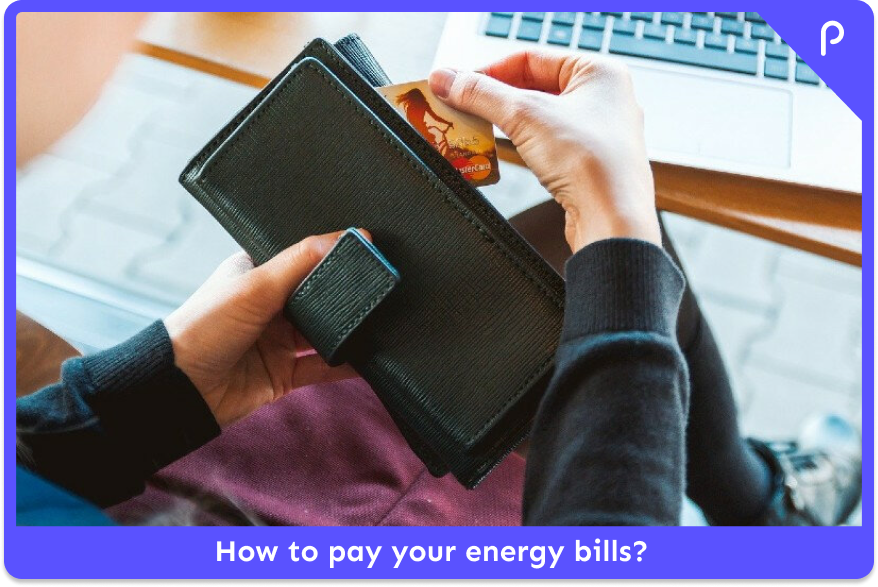How to pay your energy bills?

Needing to switch up a few things in your life?
Take back control over your energy bills! Let us guide you on how to make big savings.
⭐️ Save now
Staying on top of your energy payments and comparing energy prices will help you to manage your finances and ensure you don’t fall into debt to your energy company. In most cases, energy companies prefer to be paid by direct debit. Choosing direct debit will help you to pay your bills on time and minimise the amount of admin involved in the payment process.If you’re unable to pay by direct debit, or if you’d rather pay on receipt of your bill, there are a number of different options to choose from. Customers can often pay their bills online, via an app or at the bank or post office. If you’re not sure how to pay electricity bills or what the different options are, learning a little more about the process should make it easier to pay your bill every month.
Last update: November 2022
As you may have heard on the news, the UK energy market is currently under an immense amount of stress as a result of a global gas shortage driving up costs and putting several energy suppliers out of business. To learn more about this and stay updated on a daily basis you can read our page on the UK energy crisis.

How can I pay my energy bill?
In general, you have two main options when it comes to paying your energy bills. These are: direct debit and payment on receipt.
Paying my energy bill upon receipt
If you opt to pay on receipt, you’ll need to wait until you get your energy bill before paying. This can be a good option if you can’t guarantee you’ll have funds available every month or if you live in a shared house and need to collect money from a number of different people.
When paying on receipt, most energy suppliers offer a selection of options. In most cases, these will include:
- Paying your bill online or through an app
- Paying over the phone
- Paying by cheque or postal order
- Paying through your bank
- Paying with cash at any Post Office or bank
- Standing order
Contact your energy supplier to find out which payment options they accept.
Paying my energy bill by direct debit
If you choose to pay your energy bill by direct debit, your supplier will take the money from your account automatically every month. This means you won’t have to worry about going to the bank, paying online or remembering to pay on time.
In general, energy suppliers prefer to take payment by direct debit. This is because it more or less guarantees them payment and streamlines their income. There are some suppliers that offer discounts to customers who choose to pay by direct debit and others that only offer direct debit as a payment option.
Monthly direct debit
Most energy companies bill their customers every month. If you choose to pay by monthly direct debit, payment will be taken from your account every 30 days. It’s important to ensure that you always have enough cash in your bank to cover the cost of your energy payments. If you don’t, your payment won’t go through and you may fall into debt to your energy company.
Quarterly direct debit
Another option is to pay by quarterly direct debit. This means that money will only be taken from your account every three months. Paying quarterly may suit people who don’t have a regular monthly income. It can also be a good option for those who want to keep admin to a minimum.
If you choose to pay by quarterly direct debit, it’s important to remember that you’ll be paying for three months at once and so your bill will be a lot higher than when paying monthly.
Using a prepayment meter to pay your electricity bill
In some cases, customers are put on prepayment meters by their energy company. This is either done at the request of the customer or initiated by the energy company in order to help the household pay off debt that’s accumulated on their account.
If you have a prepayment meter, you’ll need to pay for your energy in advance. You do this by buying credit that’s then added to your meter. When this credit has been used up, you’ll need to buy more to keep your energy connection running.

Looking for an energy deal that best fits your needs?
Free Service
We analyse the market to find you the best fitting deal on the market.
More info
How can I top up my prepayment meter?
If you have a smart prepayment meter, you’ll be able to top up online or by using your supplier’s app. This is the easiest way to buy credit as you don’t need to leave the house and can top up your account whenever you need to.
If you don’t have a smart prepayment meter, you’ll need to take your prepayment card to your most convenient pay point and top up in person. You can top up prepayment cards at:
- The Post Office
- A PayPoint outlet
- A PayZone outlet
As not all suppliers accept all forms of payment, you’ll need to check with your energy company about the exact payment options they offer.
How to get help paying your energy bills?
If you’re having trouble paying your energy bills, the first thing you should do is get in touch with your supplier. They’ll be able to advise you on any schemes or grants you might be eligible for and can work with you to help you avoid going into debt.
Some suppliers offer grants to households that are struggling to pay their bills. If your supplier doesn’t offer a grant, they should be able to help you to apply for schemes like The Warm Home Discount, Cold Weather Payments and Winter Fuel Payments.
Warm Home Discount
The Warm Home Discount gives eligible households £140 off of their winter fuel bill. This discount is generally applied between November and the end of March. The money isn’t paid to you directly, instead, it’s given to your energy supplier and then deducted from your fuel bill.
If you’re of State Pension age and already receive the Guarantee Credit part of the Pension Credit scheme, you’ll automatically be eligible for the discount. You may also qualify if you receive another type of means tested benefit like Job Seekers’ Allowance. The eligibility criteria for the Warm Home Discount vary between suppliers, so check with your energy company to see if you qualify.
Cold Weather Payment
Cold Weather Payments are given to eligible households when the temperature falls below 0˚C for 7 consecutive days or more. If you qualify for the payments, you’ll receive £25 for each 7-day period.
You may be eligible for Cold Weather Payments if you receive one of the following benefits:
- Pension Credit
- Income Support
- Income-based Jobseeker’s Allowance
- Income-related Employment and Support Allowance
- Universal Credit
- Support for Mortgage Interest
Winter Fuel Payment
If you’re of State Pension age, you could receive between £100 and £300 per year to help you cover the cost of winter fuel payments. The amount you receive will depend on your personal circumstances, like who you live with, which benefits you receive and whether or not you live in supported housing.
If you qualify, you should receive your payment automatically by the end of March each year. If you think you qualify and haven’t received your payment, contact the Winter Fuel Payment centre to find out more.
Other government subsidies
There may be other government subsidies available to help you cover the cost of heating your home during the winter months. Contact Citizens Advice to find out which discounts and benefits you’re eligible for.
![]()
If you are struggling to pay your energy bills, it’s important to act as soon as possible. Accessing discounts, benefits and other schemes early on will help to avoid debt building up and help you to stay on top of your finances.
Using Fuel Direct
If you receive certain income-related benefits, you may be able to use Fuel Direct to pay your bills. Fuel Direct is a government scheme that allows bill payments to be taken from your benefits before you receive them.
This can be useful if you find it difficult to budget every month or if you just want to ensure that your bills are always paid on time. Fuel Direct can also be helpful if you’ve fallen into debt to your energy company and have been put onto a repayment plan.
The benefits that can be used for Fuel Direct are:
- Universal Credit
- Income-based Jobseeker’s Allowance
- Income-related Employment and Support Allowance
- Income Support
- Pension Credit
If you think Fuel Direct could help you stay on top of your energy bills, you can apply at your local JobCentre Plus (or Pension Centre if you’re on Pension Credit). When applying, you’ll need to supply:
- Details of who you owe and how much
- Your customer reference number (You should be able to find this on your energy bills)
- Your National Insurance number
The amount that’s deducted will depend on the credit you receive and on the type of bill you’re paying. If you’re on Universal Credit, up to 5% of your benefits can be deducted to pay for your energy bills.
Would you like to know more about comparing energy prices? Great! Check out these related articles
Looking to switch energy deals?Leave your phone number to request a call back from us!
Free Service
FAQ
Can I pay my energy bill online?
Most energy companies allow customers to pay their energy bills online. To do this, you’ll need to log into your energy account and submit your payment details. If your supplier has an app, you should also be able to use this to pay your bills quickly and easily when you’re on the move.
Which app is best for electricity bill payment?
In most cases, you’ll need to use your energy supplier’s dedicated app if you want to pay your energy bill using your smartphone. Although not all energy companies have apps, the number that do is growing quickly. Check with your energy supplier to find out what digital tools they offer.
Can I pay my electric bill at the Post Office?
Most energy suppliers allow you to pay your gas or electricity bill at the Post Office. You should also be able to pay at the bank and at your nearest PayPoint or PayZone.
How can I pay my energy bill?
You can either pay your energy bill automatically by direct debit or you can opt to pay your bill on receipt. If you choose to pay on receipt, you’ll need to pay online or head to your local bank, Post Office, PayZone or Paypoint when you receive your energy bill.
Updated on 11 Nov, 2022
Alex
Energy Specialist & Copywriter
william
Website manager

